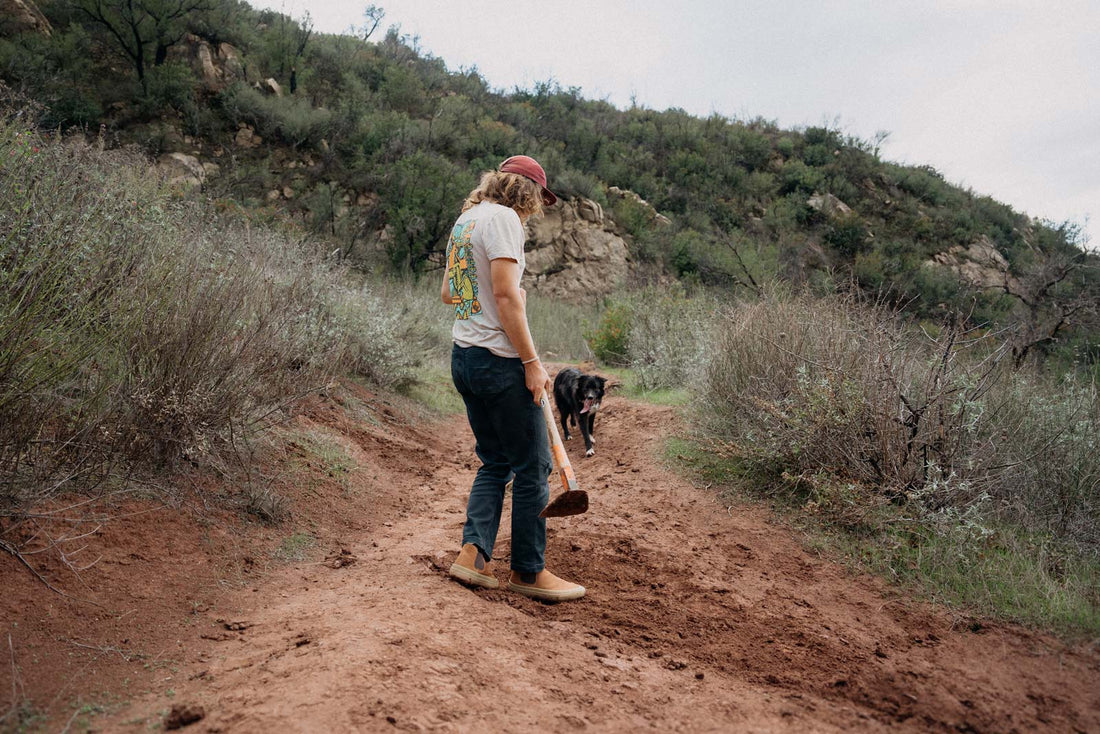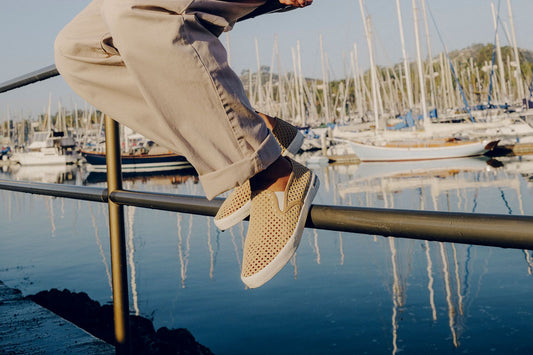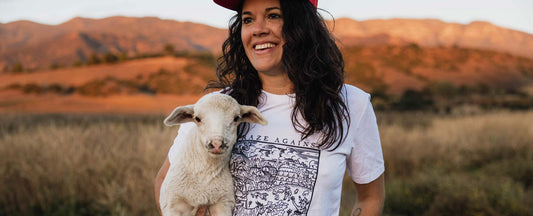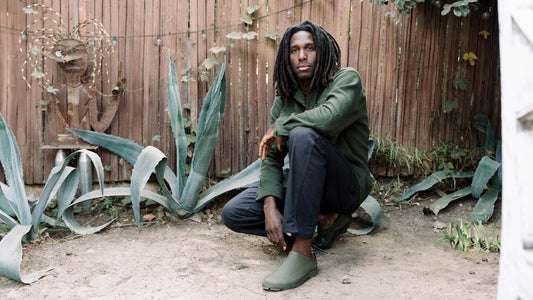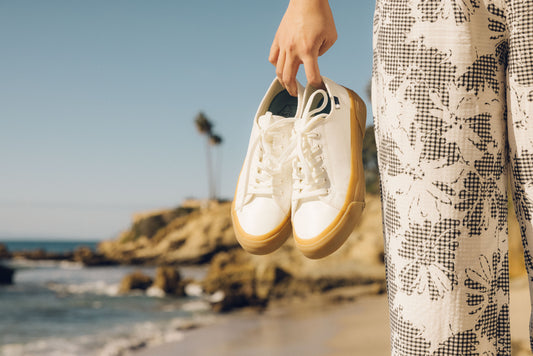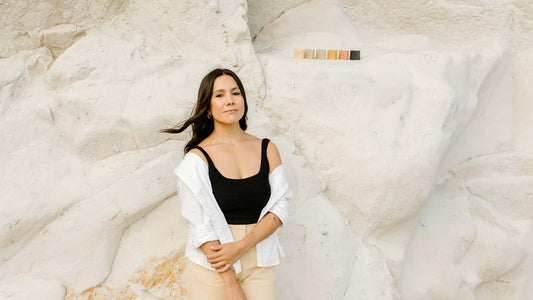Like many kids, Dillon Osleger struggled to fit into the rigid social and academic structures of school. “I did so badly in math and science, I nearly flunked those classes,” he says. “I grew up idolizing my parents. They’re both scientists, and it can be really frustrating to idolize and want a career like that, yet continue to fail at it.”
To combat his anxiety over grades, Dillon would escape on his mountain bike into a network of trails near his childhood home. There, he’d spend hours helping older bikers and hikers fix up trails marred by wildfires and harsh winter weather, or observing insects scuttling across tree bark. He couldn’t have known it then, but those days spent out in nature — and an openness to letting his dreams evolve — would lead to a job uniquely suited to his love of science, cycling and historical trails.
As told to SeaVees. Photography by Johnie Gall.
“I had spent so much time riding my bike as a kid that I ended up getting really fast — fast enough that I could race at an elite level. I started competing in a discipline called enduro and made it to the highest level of the sport, traveling internationally to go up against the top 100 guys in the world. Here I was in my early 20s and living what I thought was my dream. But you know how when you’re a kid and you say you want to be a firefighter, you don’t realize there’s a difference between the fire captain and the person who drives the truck? Being an enduro racer was kind of like that for me. Between working a day job, school, racing and training, I was on a bike more than 20 hours a week in between work, trying to stay as fit as guys who were making six-figure salaries from sponsors. I was stressed and exhausted, never getting to stay in the countries I was racing in long enough to actually enjoy any of the cultures or landscapes.


That dream faded pretty quickly for me. I think when you get everything you wished for and you’re still not happy, you have to invert that dream and focus on what you’re missing. I felt a deep dissatisfaction with competing against my friends instead of sharing drinks with them at some local dive bar. I hated not being able to slow down and learn more about where I was riding. You’re biking so fast you can’t give a shit about what kind of rock you’re riding over, or what ancient Romans built the corner you’re on.
Somehow, I ended up getting into college. It’s a miracle I was even accepted because I graduated with a 2.9 GPA — the only reason I got in was because I was reasonably good at skiing and they had a team I could join. I remember sitting in an intro biology course and being so unenthused. I didn’t want to grow pea plants or fruit flies or learn about DNA; I wanted to know more about all the things I’d noticed just by being out on the trails growing up. I started asking about the mountain pine beetle in whitebark pine, wanting to know more about the relationship between climate change and this insect's effect on the trees around me. Through pure luck, a teaching assistant in my class was a graduate student doing research for the U.S. Forest Service who knew someone working on that question, so she connected us.
“I think when you get everything you wished for and you’re still not happy, you have to invert that dream and focus on what you’re missing.”
It was then that I realized, while I may have sucked in classrooms and on standardized tests as a kid, the kind of questions I’d been asking my whole life were legitimate scientific ones. People started to welcome me into the fold for once instead of threatening to make me retake a course or hold me back. The reality was that all the time I’d spent biking was my connection to that dream I had of becoming a scientist. You don’t need a degree or a white lab coat to be a scientist, all you need is to be good at observing and following curiosity.

It’s hard to express how fast the flip switched for me. Within a year I had a 4.0 GPA with honors. I graduated in three and a half years with degrees in engineering, snow science, and geology with minors in astrophysics, hydrology and photography. I went to work right away as an avalanche forecaster and an ecologist with the National Park Service.
“People started to welcome me into the fold for once instead of threatening to make me retake a course or hold me back.”
I have a very hard time being an expert in anything. I can’t tell you as many rocks and minerals as a perfect geologist can, or as much about a place as some ecologists can. Where I think I excel is in being able to think about all of it as part of a larger system: geology can’t happen without climate and soils can’t happen without geology and biology. I think being a jack of all trades is perhaps better for me than being a master of one. I have a lot of degrees, but in reality they are just a representation of asking a lot of questions.


So now I was following this dream of being a scientist but I wasn’t sure what to do with it. I still loved riding my bike, and I was craving community and a physical connection to a place, so I found a local trail stewardship nonprofit in Santa Barbara called Sage Trail Alliance and started volunteering with them. Within a few years, I became their Executive Director. Today, we work with other regional nonprofits and trail crews and are hoping to increase access to 280 kilometers of trail within the next couple years. I don’t know if we’d have even 70 kilometers without paid staff — that’s why it’s so important to donate to your local trail nonprofit.

There’s no job description given to you when you switch from volunteer to suddenly being in charge. You’re trying to find a balance of those things that are your dream and make you happy with those things that are the foundations of how capitalism works. There’s a side of me that’s stoked on getting to work as a scientist and do labor and work on environmental policy, but at the same time I also have to be the guy sending out Mailchimp emails and figuring out QuickBooks.
“You’re trying to find a balance of those things that are your dream and make you happy with those things that are the foundations of how capitalism works.”
My biggest accomplishments have been the things that aren’t sexy. Working with Ventura Land Trust, I was able to help responsibly design and build trails in a city where, just three years ago, if a resident wanted to go for a hike they’d have to drive 30 minutes to the next town over. Those people now have 15 miles of trail they can access right from their backdoors — we have more than 176,000 visits a year. Those hikers and bikers may never know who we are or donate to Sage, but I don’t need to scream our impact from the rooftops because I’ve realized a tiny nonprofit can make small differences that end up working their way up the chain.
A friend of mine visited the Navajo Nation and had given the kids there some free bikes, so I ended up going to the reservation to help build trails with them there. They had taken it on their own accord to make trails that followed existing historical horse and trade routes, so they were creating their own future with bikes, but also reconnecting with their past while doing it. There have been many people before me caring for trails and many who will come after.


There is so much history under your feet. I’ve found dinosaur fossils while working on trails. Old Indigenous cave paintings, old ranch brands, hood ornaments from Chevy’s in the 1940s. There’s been a very long history of erasure dating all the way back to the Lewis and Clark expedition — there are people who were part of that who were African American and Indigenous who weren’t given credit for their trail building and stewardship. American trails are American history, and I think that’s so cool.
When you’re hiking, you’re passing all these things left in the dirt that can make you realize a trail doesn’t just exist in the present moment. There’s nothing new to learn, there’s just what we haven’t found in history yet. I find the history of trails one of the driving forces for why I care so much. I love nerding out over old historic maps and finding trails that have disappeared to time and natural disasters, and figuring out where they came from. I am on a never-ending quest diving down the rabbit hole of the history of place and coming back up to share with others so they feel a deeper connection to the places they visit.
“There’s no level you get to where you’re going to be 100% confident walking to a room feeling like an expert. And if you do, then you’re probably walking into the wrong rooms.”
I recently went to Washington, D.C. to lobby for climate action and sustainable renewable energy with a group called Protect Our Winters. I’m this California guy who does blue-collar labor all day and I land in Baltimore with my wool suit on. It’s humid as hell, so I’m sweating through my undershirt, looking like this total novice. But guess what? All those people on Capitol Hill are human. They go on hikes. They have grandkids who mountain bike. You realize you have something in common with everyone in the room — I met with a Colorado congressman who ended up also being a geology nerd and he told me his aides have to bring him three clean linen shirts a day he sweats so much [laughs]. I was like, ‘Darn, I only brought one on the whole trip!’ There’s no level you get to where you’re going to be 100% confident walking to a room feeling like an expert. And if you do, then you’re probably walking into the wrong rooms.

This is still my dream job, but my next dream is to lose the dream job. There’s no C-suite position out there where I’m like, ‘that looks sick.’ The whole goal at this point is to get people to stop taking these public lands for granted — my job is to be a caretaker, but also to remind people that a lot of hands make lighter work. I want to get Sage to a point where it’s bigger and has enough funding to have a bunch of people take my place, or to have enough volunteers out there who understand public lands are their responsibility.
“You can do your absolute best at following a dream and fail, but I guarantee someone will try to help lift you up again.”
The times I’ve struggled the most, a hand will reach out from nowhere to pat me on the back or point me in the right direction. You can do your absolute best at following a dream and fail, but I guarantee someone will try to help lift you up again. Someone out there wants to be your mentor or support your vision— you just have to start asking questions and making mistakes. No one will ever blame you for trying. I think no matter what you try to do in life, you end up narrowing down the options to find what you’re really looking for.
Dillon wears the Ballard Boot from the Men’s Adventure Collection. Become a member of Sage Trail Alliance here.

